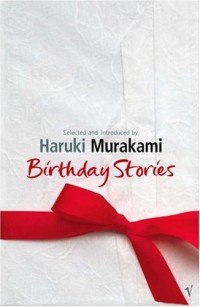One of them would die first
 Birthday Stories
Birthday Stories
selected by Haruki Murakami
Japanese text translated by Jay Rubin
When rearranging my TBR on my new shelves just before my birthday, I spotted this title that seemed like it would be pretty appropriate birthday reading. Even more appropriately, today is the birthday of the book’s editor, Haruki Murakami (happy 67th birthday Haruki!). This slim collection of 13 short stories is not the most cheerful but it provides a good introduction to a variety of authors.
The book started life as a collection of works in English translated into Japanese by Murakami, with an added short story of his own that he wrote specially. For this English edition he has written an introduction about the curation process and perhaps reading this first gave me a slightly negative start. First, Murakami freely admits that he is not a big birthday person himself and that the stories he found tend to be dark and unhappy. Second, he struggled to find enough stories and ended up asking friends, editors and agents for ideas, which does not suggest a rich treasure trove from which to curate a “best of”. But it’s a nice idea and there were a couple of authors here – David Foster Wallace and Claire Keegan – who I’d been meaning to give a try, so this seemed like a good route.
You can probably tell from my tone that I wasn’t blown away. None of the stories are bad, by any means. There is some beautiful writing and some storylines have lingered in my brain, which I consider a positive sign. But none of them stunned or surprised me either.
“Charlotte settled into the chair she always occupied in the drawing-room, to the left of the fire. The light from the long-paned windows fell on her neat grey hair and the side of her face. One of them would die first, Odo had thought again in the night, as he often did now. He wanted it to be her; he wanted to be the one to suffer the loneliness and distress. It would be the same for either of them, and he wanted it to be him who had to bear the painful burden.”
—William Trevor
Arguably, Murakami’s own feelings about birthdays are reflected in his choices, because in most of these stories, the fact it is someone’s birthday is almost arbitrary, at most a reason for events to be imbued with extra significance that the main character does not feel to be necessary. There is also a hint of Murakami’s writing style, in that I tended to find the stories slightly cold and detached – observations of life rather than emotional explorations. And that works perfectly fine in every case, but a little more variety of tone and style might have helped make the book more enjoyable, at least for me.
I liked that Murakami had written a short piece about every author to introduce each story, but this also served to underline the lack of diversity on display. Of the 12 authors who are not Murakami, 9 are men; 10 are from the US (the other 2 are Irish); 8 were born within a decade of Murakami; and all are white. Most were names already familiar to me but there were a couple of new ones, which I did appreciate.
“Shake off the blue clean. You’re half-bleached, loose and soft, tenderized, pads of fingers wrinkled. The mist of the pool’s too clean smell is in your eyes; it breaks light into gentle color. Knock your head with the heel of your hand. One side has a flabby echo. Cock your head to the side and hop – sudden heat in your ear, delicious and brain-warmed water turns cold on the nautilus of your ear’s outside.”
—David Foster Wallace
“The birthday cake” by Daniel Lyons is one story that has stayed with me, with its account of an old woman on her regular weekly trip to the baker being floored by a sudden request. Another I enjoyed is “Turning” by Lynda Sexson, which explores storytelling and the perception of adults versus children. Murakami’s own contribution, “Birthday girl”, contains the only hint of fantasy in the volume. It is true to his usual style and I think I would have felt warmer towards it either in a collection solely of his work, or of a much wider variety.
I suspect mine is quite a personal indifference and doesn’t reflect how most people would respond to this book. There are contributions here from Raymond Carver, Russell Banks, Paul Theroux and other giants of the short story. It turns out that those are not names that excite me.
First published in Japanese in 2002 by Choukoron-Shinsha.
First published in English in 2004 by the Harvill Press.